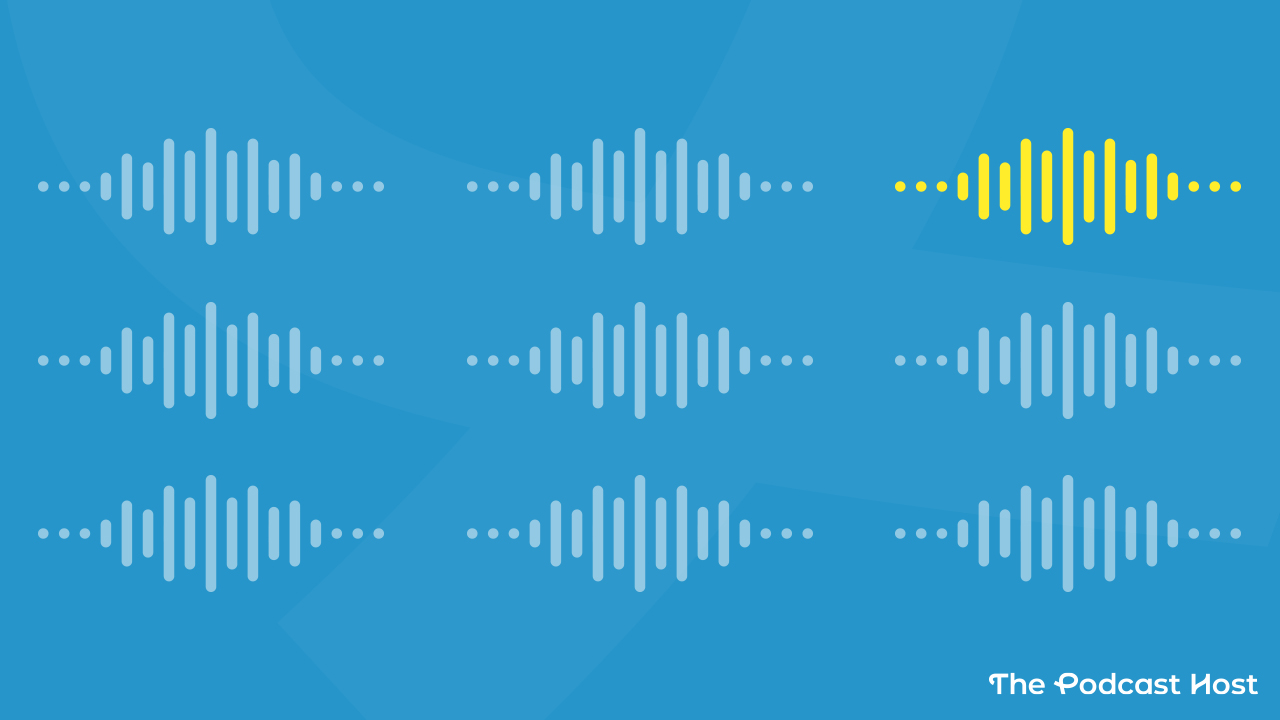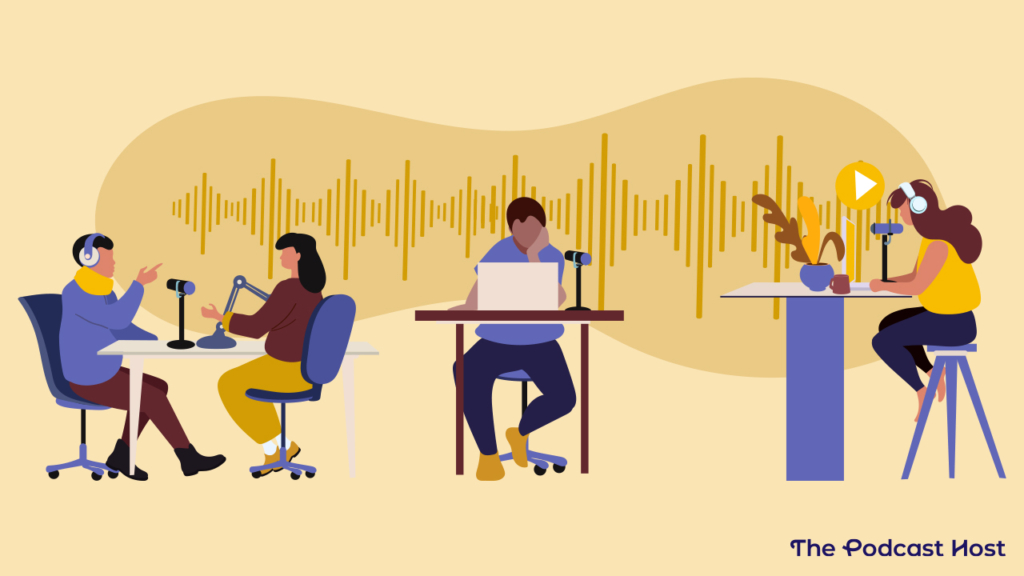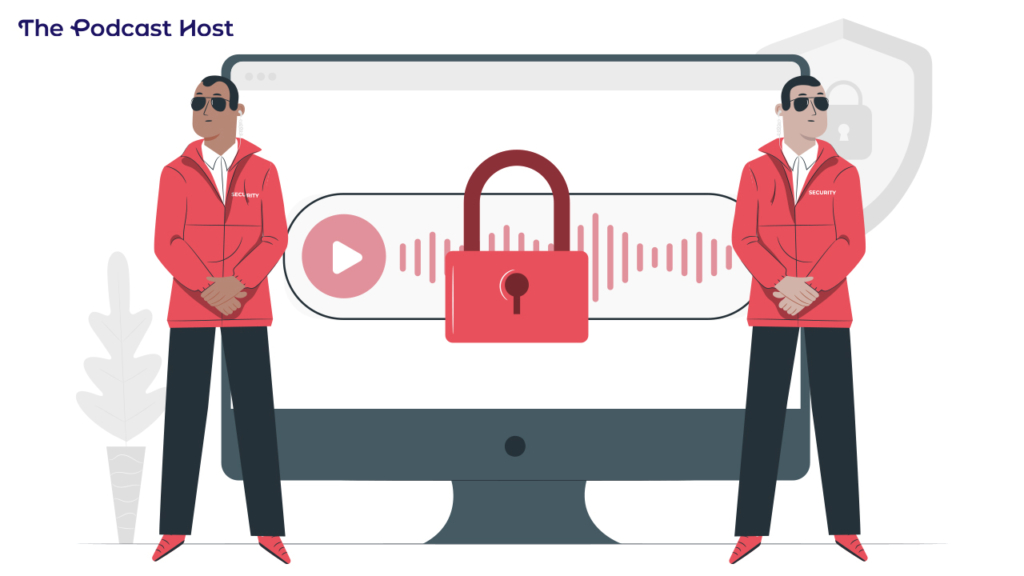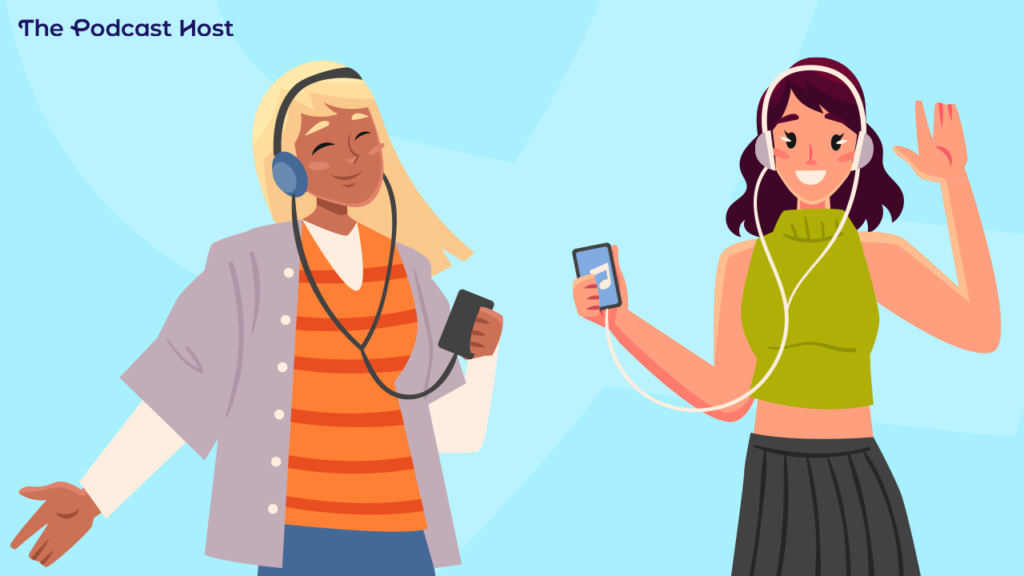How to Make Your Podcast Unique: What’s Your USP?

Every successful podcast has to be unique in some way. If there’s no uniqueness, then there’s no draw. There’s no reason to listen.
And with well over two and a half million shows in Apple Podcasts, you have to give people a reason to listen.
So, how do you make YOUR podcast unique?
- What You Think Is Unique Might Not Be
- How-to #1: The Format Unique features, length, frequency and hosts
- How-to #2: The Topic Personal angle, niche, and more
- How-to #3: The Outcome Case studies: Today, Explained and Podcraft
- How-to #4: Production Quality Editing, atmosphere, and raising the bar for quality
- How-to #5: YOU! Personality, psychographics, and the comparison trap
Taking on a new podcast, as a listener, is a commitment. Don’t underestimate that. It’s giving up 20 minutes of your time, at a minimum, to find out: is this any good? Is this going to make my life better?
Dramatic? Yea. But true? Undoubtedly.
They want a problem solved. Anything from the deep three – health, wealth and happiness – to the surface one – fighting boredom. They pick their problem, and they search for a topic based on that. So, when they find your category, the question becomes: “Why should I listen to this particular show, and not one of the other squillion shows on video games?”
That’s where your uniqueness comes in.
It’s what makes you stand out from the crowd. It’s what attracts listeners to you like a moth to the flame.
But do you know what your uniqueness is? Or your unique selling proposition, as some call it? That’s what we’re here for.
How to Make Your Podcast Unique
What follows is a breakdown of all the ways that I’ve seen people find their uniqueness. Some are unique to podcasting, and some apply to anything. Either way, if you can find one or two elements here that you can apply to your podcast, you’re well on your way to having a great answer to the question.
If you’re in the business niche, we also have a post on making a business podcast that stands out. In some ways, the requirements can be a little different, but in most cases, it’s all the same. Any good business show works because of the personality behind it, and the uniqueness it shows. So, read them both!
Either way, next time someone asks: “Ooh, why should I listen to your show?” – you’ll be able to say, with confidence: “Now, let me tell you!”

First, What you Think is Unique Might NOT Be Unique!
There’s one trap that a lot of podcasters fall into. They pick a uniqueness that is anything but. Sounds silly, yeah? But you see it all the time on the high street.
- “We’re the bank that gives great customer service.”
- “We’re the window cleaners that make your windows shine!”
- “We’re the restaurant that gives you great value.”
Good aspirations, sure. But, not unique. Every competitor out there will claim the same thing.
Name me a bank who will say, “Nah, we don’t bother with good customer service.”
Show me a window cleaner who WON’T claim to give you shiny windows.
Find a restaurant that doesn’t claim to offer good value. Even top-of-range establishments will say their food, the experience, is worth it.
Here’s the test: can you think of a competitor who would say this? “Nope, we don’t do that.”
Your USP can rarely be quality, value, or entertainment. They’re a given in most environments
You need something else. Something that not everyone wants to do.
For example:
- The bank that offers live chat customer service
- The window cleaner who ALSO makes your car windows shine
- The restaurant that offers the cheapest prices in town on graham cracker mozzarella sticks.
How to Make Your Podcast Unique #1 – The Format
Podcast format is the most functional way to be unique. Find a format others haven’t tried, and you start generating interest immediately.
What does that mean? It means NOT following everyone else’s example, running a stock-standard interview show where you “chat about life with an expert” for 30 minutes every week.
There are a few ways to do this.
Break it up With Unique Features
Andrew and Pete’s podcast is a great example of this. They do things differently in so many ways, but one is in the repeating features they run every week, many of which are really unique.
For example, on their last series, they ran a feature called ‘Tool Don’t Drool’. The idea is that the guest has to share one of their favourite tools. Same old, same old, you think. At first… Then you realise that the guest has to do it with a mouthful of water! Kinda crazy, and definitely not for everyone, but it suits Andrew and Pete’s style perfectly. And most importantly, it’s really unique. It teaches the listener something – the tool – while also providing a bit of a laugh, and something really memorable.
So, standard interview, to begin, but a segment format, and unique approaches to each segment to turn that into something different.
Of course, it’s possible to go too far with this and turn yourself into a show of gimmicks, but even simple features can work really well. For example, a listener call-in section can be enough to stand out if you make it a regular feature, or a “weekly tool tip” without the water, but with your own particular take on it. Your listeners will remember you because of the useful, memorable features you run, and they’ll come back for more.
Length
This is a simple one, but it works! Try a different length.
So many shows are 20 to 30 minutes long, and even more hover close to the hour mark. Do you know why? It’s for the same reason meetings are always 30 or 60 minutes long… That’s the way our tech works! Book a calendar slot, and it shows up 30 or 60 minutes by default! It’s not because that’s a good length for a show – it’s just a default.
Many shows are doing really well right now by exploring the ‘short form’. Daily news podcasts, or ‘short, sharp tips’. It stands out because people can get a quick hit of info or entertainment.
Super long shows stand out for the same reason – they’re bit different.
People listen to Dan Carlin on Hardcore History because he goes in-depth for hours. Tim Ferriss too – one of his biggest unique hooks is going into the most minute detail on his show, delving into a person’s approach to life – again, for hours.
If most folks in your niche are doing 30-minute interviews, try 10-minute tidbits. You’ll be unique.
Frequency
Frequency is a hard one to stand out on alone. There are only so many different release schedules you can follow, and there are already plenty of daily, bi-weekly, weekly, fortnightly, monthly, and on…
But… it has worked in the past, it’ll work again, and it can be a strong combining factor with another USP. For example, do a short-length daily show covering one quick tip on your topic. Or, do a monthly show that goes four hours with a group of experts and comes out with a series of actions you can take over four weeks to make a change in your life.
Frequency might not be as powerful a USP as it used to be, but it can be a multiplier with other factors.
Hosts
This can make a big difference because so many shows, today, are the same host every week, with a different guest.
Instead, try two hosts and one guest. It brings in a whole new dynamic. Look at 3 Marketers Walk Into a Bar. Rob and Kennedy bring the banter and feed off themselves, at the same time as getting the most from the guest.
If you can get both hosts in the same location, recording locally, that can be another unique element. The quality shifts massively when you’re in a room together, rather than an online call.
Finally, go bigger!
Get three or more people on. It can take a lot more management, and it takes a good lead host to facilitate. But a group conversation can bring in so much value and be so much more entertaining.
One of my earliest podcast loves – Movies You Should See – nailed this. They had five or six regular hosts, running three or four of them on any given episode, and all recording in the same room. The chemistry was amazing and entirely different from every other movie show out there featuring a couple of people stuttering their way through a bad Skype call.
How to Make Your Podcast Unique #2 – The Topic
Next, we’ve got your topic. Get the topic right, and it can be enough, on its own, to propel a podcast to success.
The biggest mistake people make is going too broad. I’m afraid that a general ‘health and fitness’ show is going to be a pretty hard sell. Instead, you need to speak to a much smaller audience.
Don’t worry, there’s nothing to stop you from broadening out later – seasons-based podcasting is ideal for that – but you’ll grow your first few thousand listeners much, much easier if you target them specifically, so they know, at first sight, the show speaks directly to them.
There are two aspects to this.
Personal Angle
You can go broad in topic but narrow your audience by the angle you take on it. An ‘angle’ is a particular viewpoint that you take on a topic, how you think about it or how you relate to it.
It’s important to know exactly who your ideal listener is before thinking this through. It’s their situation, their way of thinking, and their problems, that all power the angle you should take. We go deeper into this in our guide to creating your podcast avatar.
So, what kind of angle could we put on Health and Fitness, for example?
Well, say you’re a new parent, and you figured out how to keep going to the gym, and how to stay healthy during that crazy first year. Your angle is your situation: being a new parent. Health and Fitness for new parents. Or even more specific: health and fitness for new mums.
Taking an angle on a topic means that you can still cover the whole subject – you just relate it to a particular situation.
The possibilities to make your podcast unique are endless here:
- Politics for Schoolkids
- Mountain Biking for Retirees
- Comedy for Buddhists
Choose your wide topic, and think about what angle you can put on it. There’s your uniqueness.
Niche
Whereas an angle lets you talk about a whole topic from a particular point of view, a niche instead narrows down what parts of the topic you cover. It just means going deeper and deeper, more and more specific, until you have a really tight niche that a very specific audience group (that ideal listener or avatar I mentioned earlier) strongly identify with.
It tends to be that the tighter the niche, the smaller the audience, but the easier it is to persuade them to listen because it’s so clear how relevant the topic is to them.
Taking health and fitness again, a niche of that might be Crossfit. It’s a segment of health and fitness, all on its own, and there’s an army of Crossfit fanatics that wouldn’t give two hoots about a general health and fitness show but would run a 500m, 50kg farmer’s carry to listen to your Crossfit podcast.
Again, some examples related to the ones above:
- Scottish Socialist Politics – choosing a country and a segment of politics only
- The Mountain Biking Gear Review Show – talking about just one aspect of biking: equipment
- The Clean Startup Comedy Show – funny stories about startups you can listen to with your kids in the car

“But I Don’t Want to Limit My Audience!”
I know, I know but don’t worry. I would argue it’s almost impossible to go too niche. With a worldwide audience, you’ll always find a decent group of people who love the same specific subject you do.
Remember, again, that it’s possible to branch out later, once you’ve got that initial audience. Once you have their trust, they’ll follow you to related topics, and you’ll be able to attract a new group of listeners in the process.
Seasons are your friend here. Do season one on “Nintendo Video Games from the 90s”. That’ll attract a really particular audience. But then season two could be “Sega Games in the 90s.” Those original listeners will still be interested, even if it’s not their platform, and you’ll attract a whole new hardcore Sega audience too.
In the end, 200 episodes in, you might be running a show about general video games with a million listeners, but it starts with those hardcore specific listeners who grow to know you, like you, trust you, and follow you on the journey.
How to Make Your Podcast Unique #3 – The Outcome
For me, the outcome of your show is a great place to stand out and differentiate. And it’s one which is rarely used.
The outcome is what your listeners get from the show. It’s the change in your listener as a result of listening.
In some cases, this falls into the ‘NOT unique’ category we talked about earlier. For example, in a comedy show: the outcome is less boredom, more fun. But you won’t find many comedy shows that DON’T claim that.
A unique outcome, though, is very possible.
Case Study: Today, Explained
Take Today Explained, as an example.
Today Explained is a news show – so it’s in a busy, busy niche. But its USP is the outcome – it’ll help you understand just one thing in today’s news.
For some news shows, the outcome is that you’ll be up to date on the headlines. You’ll know a little bit about a LOT of news.
But, for Today Explained, the outcome is that they’ll explain, to the complete novice, just one thing. They’ll go from first principles, assuming no prior knowledge, and they’ll explain it all. The outcome is that geopolitically challenged people like me can talk about current affairs without looking like a complete idiot.
Notice there’s a niche here, too – a niche audience of news novices. Another show might aim at news experts, going super deep on one topic but starting at a much higher level and covering more detail. That’s how USP elements can combine to create a really unique show.
Case Study: Podcraft
Effective outcome USPs can often include actions.
On Podcraft, I see outcome as one of our USPs. Each season, we cover one topic in-depth, and the outcome is that you’ll understand that topic and be told the exact next steps to take to put it all into action. The ‘next steps’ are the key outcome – you’ll have solid, concrete actions to DO.
For example, Season 2: Podcast Equipment. At the end of episode one, you’ll know exactly what microphone to buy. Episode two, you’ll know whether to get a mixer or not. At the end of the season, the outcome is that you have a shopping list and setup instructions for your podcasting gear.
To create a good outcome USP, paint a really strong picture of how your listener will change as a result of listening and how you’ll get them there. This needs specifics and might well tie into another of the categories here. It can be really powerful if you can pull it off. People are often looking for transformation!
How to Make Your Podcast Unique #4 – Production Quality
This is an area where time spent and skills learned can make a big difference.
The majority of podcasts have always been relatively low-production hobby shows. It makes sense – the medium grew up around the ‘friends in their basement’ conversations, which are great to listen to, entertaining as hell, but low on quality control and high on ramble. Same with the rise of the interview show – 45 minutes to an hour is the standard, a dodgy remote call is the default, and the average approach is to fire out the interview unedited, mainly because… well, who has time to edit!?
So, if you put the time in and raise the quality, you can create something a league above the average.
My favourite example here is How I Built This with Guy Raz. On the face of it, it’s just an interview show, but two of the many ways it stands out fall right into the production quality category.
Take Time to Edit
Firstly, these interviews are edited down to the highlights, and Guy provides a voice-over narrative to bridge those entertaining bits, and move things along briskly. There’s no fat, no rambling. It’s all quality because their team selects what makes it into the show. I don’t know the numbers, but I’d wager Guy spends at least twice as long talking to his guests as the eventual show length, and it wouldn’t surprise me to hear it’s even more!
This can be as simple as taking an interview, getting a transcript, and picking out three or four sections of the show as the highlights, each perhaps five to 10 minutes long. Then, edit out the rest, and cut the highlights together. Script out a quick intro linking one to the next if you want, but even that’s not necessary. Cutting your interview in half will often double the quality. And that can be a USP.
By the way, if you’ve never edited audio before and find the thought quite intimidating, OR you want to spend as little time as possible on it, be sure to check out Alitu. Alitu is our ‘Podcast Maker’ tool that makes recording, editing, producing, and publishing a podcast as simple as humanly possible. It has everything you need to run a podcast, including auto-generated transcriptions and the ability to publish directly to Apple, Spotify, and everywhere else you find podcasts. Try it free for seven days and see for yourself.
Add Some Atmosphere
While you’re at it, add a little music. Some effects. Just a little atmosphere. It’s not a huge job to select a bit of royalty-free music, drop it into your session, and swell it up underneath a particularly dramatic part of the interview. It adds drama, highlights a part of the story, and brings a whole bunch of polish to your show, as well as a uniqueness in your niche.
Raise the Quality Bar
A final place How I Built This stands out is in recording quality. Whether they are or not, Guy and his guest sound like they’re in the same great-sounding room, on top-quality recording equipment. This means the audio is flawless in the first place.
It also means that the conversation just flows, like any natural chat. You’ve all heard the stuttering remote call exchange of doom, where a 1-second lag means the chat never quite gets into the groove. They’re talking over each other, stopping, starting; it’s just not great. It’s standard, but still not great.
So, if you can get in a room with someone and bring some decent mics, you’re unique in a significant way. And people will listen and return for that polish.
That said, you don’t need to be in the same room to record great-sounding podcasts these days. Check out our roundup of the best remote recording tools to make you and your guest sound like you’re in the studio together – even if you’re thousands of miles apart.
How to Make Your Podcast Unique #5 – YOU!
I just want to say something quickly about YOU.
Yes, YOU are unique, and your own personality is a big part of the show. But it’s dangerous to think of this as the only USP you have.
There are a lot of people in the world who are funny, quirky, entertaining, educational, inspiring, motivational, and more. For sure, you are the only YOU out there, and you’ll win listeners because of that. But it’s hard to engineer it, and it’s also really hard to put that across in a description or the show concept.
A big part of your USP is convincing someone in just a few sentences why they should listen to your show amongst the thousands of others out there.
Your background and experience might be a factor in that – that’s what makes your angle, above. But it’s hard to do that initial convincing through personality alone. The listener has to… well…. listen, before they get it!

Cement the “YOU” through Psychographics
One way to put some meat on the bones of “personality”, though, is by thinking Psychographics rather than demographics. This is delving into how your audience thinks, rather than what they are. That can tie back into your ‘angle’, above, or it can turn your own personality into a USP in certain cases. For more info, take a look at that article and see if you can nail down your perfect listener’s thought process!
In many cases, though, it’s a good idea to save your personality for retention – bringing people back again and again. If you have an easy-to-describe USP made up from some of the other elements we’ve talked about here, then the personality is all about keeping them around.
But X, Y, Z is Popular & They Do 30 Minute Interviews About Life!
After all this, I know what you’re thinking – Joe Rogan does unedited interviews with ANYONE about ANYTHING! He basically breaks every rule here.
But, the thing is, there are always breakout shows that don’t fit the mould. Often it’s just the personality, or the following they had before they started podcasting. And the trouble is, that’s horribly hard to replicate. Try releasing your own show of the type Rogan does, and let me know how that goes for you.
Instead, if you put the work into figuring out a USP, combining a few of the elements above, then you’ll have such a strong pitch for your show. Whenever someone asks, “What’s your podcast about?” you’ll know exactly what to say. And afterwards, they’ll know exactly why they should listen. That then goes into your title, your description and your promotions all around the web.
With that behind you, you stand a much better chance of growing your audience. From there, you can move on to the next step in ‘selling’ your show: your podcast value proposition.
Ready to Test Your Podcast USP?
Now that you’ve got a decent idea of how to make your podcast unique, let’s put it to the test.
The Alitu Showplanner is a free AI-driven tool that’ll generate your podcast launch kit in minutes. Just answer some questions on what you’d like to podcast about, and it’ll fire out suggestions for descriptions, episode titles, formats, audience profiles, and it’ll even generate a draft podcast trailer script for you, too.
Then, once you have your launch kit, be sure to hop into the IndiePod Community to tell us all about it. We’d love to give you some feedback 🙂
